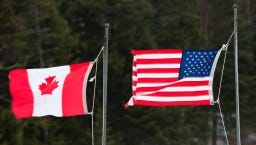U.S. slaps Canada with tariffs on lumber

A week after President Donald Trump called Canada a “disgrace” for policies that hurt Wisconsin dairy farmers, he’s slapping tariffs on Canadian lumber.
“It has been a bad week for US-Canada trade relations,” U.S. Commerce Secretary Wilbur Ross said Tuesday.
The tariffs, of up to 24%, are aimed at Canadian exports of softwood lumber into the United States – material that’s used in the building industry.
The National Association of Home Builders, based in Washington, D.C., said the tariffs could drive up the cost of new homes.
“NAHB is deeply disappointed in this short-sighted action by the U.S. Department of Commerce that will ultimately do nothing to resolve issues causing the U.S.-Canadian lumber trade dispute but will harm American consumers,” the association said in a statement.
But the U.S. timber industry, including Wisconsin loggers and sawmills, says Canada has provided unfair subsidies to its lumber companies.
Trump said it’s time to push back against Canadian policies regarding dairy products and lumber – two of Wisconsin’s largest industries.
“We can’t let Canada or anybody else take advantage and do what they did to our workers and to our farmers,” Trump said last week.
A Commerce Department investigation found that Canada has improperly subsidized its softwood lumber exporters, and the U.S. could begin collecting tariffs on shipments crossing the border as early as this week. Rates will vary from 3% to 24% depending on the shipment.
The tariffs are welcomed here because the U.S. has been flooded with cheap Canadian lumber, according to Wisconsin timber companies.
“I don’t really like government intervention into business, but I think it’s something that is necessary at this point to put us back on an even playing field,” said Tim Kassis, international sales manager at Kretz Lumber Co. in Antigo.
Kretz manages thousands of acres of timberland in northern Wisconsin and the Upper Peninsula of Michigan.
“Canada’s costs are so cheap coming into the U.S. that it’s really hurt our business,” Kassis said.
Much of the cost difference has been from the strong U.S. dollar that’s made it about 30% cheaper to buy Canadian products.
“That’s a dramatic advantage for them,” said Matt Jensen, vice president of the Great Lakes Timber Professionals Association in Rhinelander.
“The tariffs, in my mind, are necessary,” Jensen said.
Much of Wisconsin’s timber industry is based on hardwoods, such as oak, maple and cherry, and those aren’t covered under the tariffs.
That business also has struggled against cheaper Canadian imports.
“Canada is just killing us,” said Gordon Connor, owner of Nicolet Hardwoods Corp.in Laona.
In Canada, forest lands are owned mostly by the government. Canadian provinces boost lumber producers' ability to compete with the U.S. by lowering royalty rates for cutting trees.
“Their cost of doing business is just a whole different ballgame … We haven’t made money here for a couple of years,” Connor said.
Canadian Prime Minister Justin Trudeau said that Canada and the U.S. could suffer from a “thickening” border as trade tensions escalate over lumber and dairy products.
The two nations are economically connected.
“There are millions of good U.S. jobs that depend on the smooth flow of goods, services and people back and forth across our border,” Trudeau said in a press conference.
The trade agreement that’s governed Canadian softwood lumber since 2006 effectively expired at the end of 2016.
Uncertainty surrounding a new pact has driven up lumber prices, the Wisconsin Builders Association and National Association of Home Builders said in a statement.
It has added almost $3,600 to the price of a new home, according to the trade groups.
Having a trade agreement with Canada could put the brakes on lumber price fluctuations.
“Normally it will settle the waters of the marketplace, which we look forward to,” said Joel Fleischman, president of Drexel Building Supply Co. in Campbellsport.
Officials said Canada is not likely to challenge the new tariffs legally under the North American Free Trade Agreement or with the World Trade Organization until next year.
The softwood spat is unfolding amid a much bigger trade issue — renegotiation of the North American Free Trade Agreement.
The tariffs come as there’s been no progress in U.S. talks with Canada over dairy products.
Some American milk exports face high tariffs. And last week, while he was in Kenosha, Trump blasted Canada over changes in its dairy pricing policies that shut dozens of Wisconsin dairy farms out of the Canadian market.
Grassland Dairy products of Greenwood notified those farms that as of May 1, it is canceling their contracts because it has lost its Canadian business.
Canadian officials have said they’re not to blame. Instead, they fault the U.S. for producing too much milk in a global marketplace that is already flooded with the product.
Tuesday, a state official said around 15 more of the farms dropped by Grassland have found buyers for their milk or have promising leads.
If those deals go through, that means 20 to 25 of the 58 farms will still need to find other milk processors by Monday or risk going out of business.
"We're continuing to find homes for farmers' milk," said Daniel Smith, a state Department of Agriculture, Trade and Consumer Protection administrator. "Our figures change almost by the hour."
Smith said he hadn't heard any updates from Gov. Scott Walker or Trump, but Walker said in a news release Tuesday that he spoke with Trump Monday and Tuesday about the Wisconsin farmers plight.
Walker said Trump talked about his decision to impose new tariffs on Canadian softwood lumber.
Trump referenced the dairy crisis on Twitter after announcing the lumber tariffs: “Canada has made business for our dairy farmers in Wisconsin and other border states very difficult. We will not stand for this. Watch!"
The Associated Press contributed to this report.